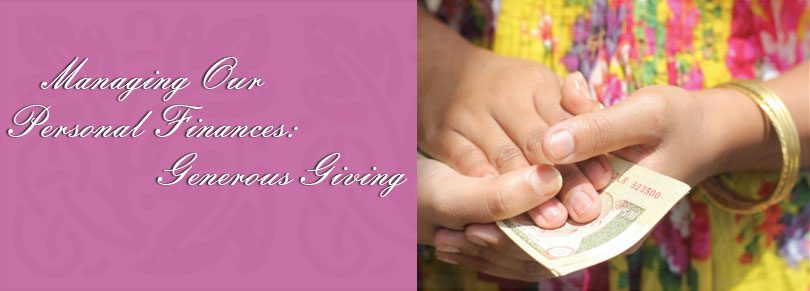Giving and receiving is one of the amazing life principles we see in nature and this is applicable to personal finances too. In the previous issue, we saw living within our means and intentional savings as important aspects of managing personal finances – that until we plan our spending and make savings a habit and a lifestyle, we may continue to search our pockets and wonder ‘where has my money gone?’
Freely we receive, freely we give!
Another important aspect of financial management is financial giving and generosity. ‘Giving’ is to be understood from the concept of stewardship – that all wealth, health, relationships and the planet earth are not earned or owned by any one or many of us. It is given to us to enjoy and care for, and leave it fit for the generations to come.
We know that everyone of us come empty handed and go empty handed. In essence, ‘giving’ is reciprocating; an open acknowledgement that I have received and have been a recipient. It is a generous and joyous releasing of what is entrusted in to our control. You and I are unsolicited recipients of a gift of life. From the moment we were conceived in our mother’s womb, born and reached the stature we are now, we owe it all to our parents, nature and God Almighty. So, life begins from life given!
Responding to the pervasive needs
There are people out there who are in need…need is everywhere… some people and some situations are desperately in need of help – both technical help and financial help – without which they may not be able to reach their full potential, and in many instances are forced into inhuman activities and millions lose their precious lives.
It is a common sight in our society where people at the traffic lights, religious centres, market places, bus and railway stations solicit alms. Moreover, charity organisations and NGOs seek funds for their charitable activities. A lot of families have survived just from alms and millions of children, women and communities have survived and thrived because of the charitable work extended from the funds raised from public.
| “No one is useless in this world who lightens the burdens of another.” – Charles Dickens |
Intentional regular giving
| “I must be willing to give whatever it takes to do good to others. This requires that I be willing to give until it hurts.” – Mother Teresa |
Financial regular giving does not come naturally. It is a learnt behaviour and it develops from intentional practice. How ever much we have and earn, if one fails to consciously develop a habit of giving, we cannot succeed in giving. If we wait to have ‘enough’ before we give, we will go the grave still unable to give. Whatever our situation in life we can and should give to those whose need is greater than ours. Not just when our heart strings are tugged but regularly and objectively.
I am aware of a number of couples who believe that God prospers them not to raise their standard of living, but to raise their standard of giving. So, over a period of time their giving has increased manifold as compared to their spending. For instance, one family we know, at the beginning of every year collectively decided how much they are going to give month on month and to whom. One of the principles they have for their family is to set aside a part of every income earned.
Other than the family giving, each member including children was encouraged to plan their personal giving. It is just like that of a farmer sowing – generous sowing brought him generous harvest. I am not aware of any person that has become a pauper because of his/her generous giving. It is not only a habit, it is also a commitment. Last year according to a study when there were job losses, stagnant wage growth, and millions were struggling to get by, ‘seven out of ten people gave to charity last year, despite the continued squeeze on households finances.
Furthermore almost two thirds (63 per cent) of those surveyed said they would make some sacrifice to continue giving if their financial circumstances changed for the worse.’
Sacrificial unconditional giving
There is an element of sacrifice in generous giving. It could be compared to parenthood which involves a lot of sacrifice – altering or giving up some of our lifestyles, hobbies, relationships for the sake of the new born child. Similarly, ‘generous giving’ is like taking a step of faith and sacrificially investing for a better world for us and for the generations that will follow us.
There are few people who have lived out such lives of passionate and sacrificial giving in the world we live in. There may be people perhaps in your neighbourhood who have modelled generous giving. Spend time with such people and learn how they got to practise such amazing giving. Chat with your parents, and elderly people in your family, who thought about others needs rather than just of themselves.
One such person has inspired me. She is very passionate in giving. She works intentionally to bless others, not only random giving. The other day for my boys’ birthdays she did beautiful embroidery on towels and engraved their names on it. My wife and I felt overwhelmed about this gesture of thoughtful and creative giving. Another attitude that is associated with generous giving is unconditional giving. It means ‘giving with no strings attached’ and with no expectations of a return gift. It is beyond the tendency of giving in order to get some favours in return.
Plan your giving
‘Giving’ therefore is one of the critical financial principles like, living within your means, planning for the future and following a spending plan. Hence, how much to give, to whom to give, how often to give and how to give (cash/kind/check) are modalities that need to be regularly thought about and decided as part of financial planning.
One of the ways to start giving intentionally is to think of your home, relatives, neighbourhood, and place of work, recreation or place of worship. It may be your maid/house helper’s family needs like their children’s educational costs; it may be one of your distant relatives who is in some need. Similarly, may be one of the office boys at your office aspires to complete his/ her high school or college…you could offer free tuition classes or even pay for a special class; in your place of recreation or religious worship look out for notice boards or announcements about personal needs and choose to contribute.
You can emerge as a point person in your neighbourhood / apartment building / office that could be approached for information about various needs that your friends and colleagues could start helping. Perhaps, you could give a talk on ‘charitable giving’ or arrange a debate on charitable giving so that the children and young people in your neighbourhood or a nearby school can think of practical ways of ‘giving’ back to society.
Of course, giving is not just financial, giving is of the whole self, our love, our time, our care. Here we have discussed financial giving as a part of financial management, but we should go beyond to give of ourselves even as we give financially.
|
“You give but little when you give of your possessions. It is when you give of yourself that you truly give.” “You can give without loving, but you cannot love without giving.” “As we work to create light for others, we naturally light our own way.” “Show me your hands. Do they have scars from giving? Show me your feet. Are they wounded in service? Show me your heart. Have you left a place for divine love?” |





